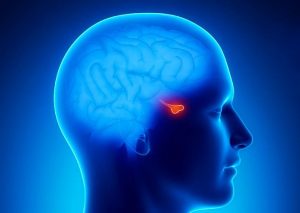Pituitary Disease
The important thing to know is that the pituitary can get diseased. By far the most common problem is known as a pituitary adenoma1. This is where random cells grow on the pituitary, which mirrors the cells that the pituitary already has.
This can result in exaggerated amounts of hormone release in the system. If the adenoma is squeezing the pituitary, which is a result of microscopic differences, it can block hormones from coming out and regulating your system.
In almost all cases, an adenoma is either going to be way too:
It is very rare, almost unheard of, to have a pituitary disease that is selective of one gland over another. It is a bit like an all or nothing proposition, in that regard. Another common problem that one might have with an adenoma is a prolactinoma2. Where prolactin is being made unnecessarily, which can lead to lactation in both men and women. It can also block:
- Fertility, and
- Menstrual cycles
There are also what are known as macroadenomas3. Which have the unfortunate ability to squeeze the optic nerves and impairing one’s vision. It can change your field of vision. But it can also trigger headaches or migraines which can be very problematic.














